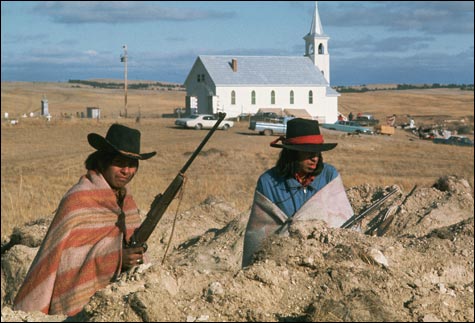
NO BULL: The "Wounded Knee" episode of We Shall Remain ranks among the best television documentaries ever made. |
| “American Experience: We Shall Remain” | WGBH Channel 2 | Mondays at 9 pm through May 11 |
Nobody likes a guilt trip. That's why filmmaker Ric Burns's 1995 Manifest Destiny documentary The Way West was such a drag. Yes, we need to accept that America is built on a genocidal foundation; that between guns and disease Europeans all but eliminated native populations from Plimoth to San Diego in a few generations. But I didn't do it; neither did you. While the 7th Cavalry was massacring the Lakota, my grandmother was tending goats in exurban Zagreb. There really wasn't much she could do to stop the madness.
Better we should redress the after-effects than wallow in dead-end guilt. The makers of the new five-part American Experience series We Shall Remain agree. Put together by five teams of white and Native American producers and directors (among them Ric Burns), the 90-minute documentaries highlight five touchstone events: the Plimoth Colony ("After the Mayflower," April 13); Shawnee efforts to unite Midwestern tribes into a separate nation ("Tecumseh's Vision," April 20); the expulsion of the Cherokee from the Southeast ("Trail of Tears," April 27); Geronimo's renegade last stand ("Geronimo," May 4); and the 1973 Lakota-FBI standoff on the Pine Ridge Reservation ("Wounded Knee," May 11).
Delivered by Benjamin Bratt, narration throughout is intelligent and rational. No scolding. No PC revisionist bull. No government lies. The official series subtext is a clearheaded "neither noble nor savage." It works. We Shall Remain demystifies a history all but demolished by myth, propaganda, and Hollywood.
Perhaps the Pilmoth Colony story is too familiar, or perhaps colonial re-enactors are by definition tedious and boring, but the series starts slowly with the plodding saga of Massasoit, Governor Bradford, Thanksgiving, and King Philip's War (well explained for a change). This installment is more "good for you" than engrossing, but stick it out. As time goes on, photographic records replace re-enactment as the primary visual tool, and things pick up.
The final two films are by far the best. Geronimo's epic journey from traumatized massacre survivor to diehard war chief to carnival exhibit is perhaps the most human story in American history. That this now-mythic figure, whose relentless campaigns caused his tribe to lose their ancestral home, was invited to lead Teddy Roosevelt's 1905 inaugural parade makes him, and by extension all Native Americans, more real and immediate than dry and distancing high-school texts ever allowed. Viewers will be amazed.
But "Wounded Knee" transcends even that revelatory coup. If you're keeping score, this program ranks among the best TV documentaries ever made. The film (all news footage and interviews) covers the Watergate-era occupation of the reservation town of Wounded Knee by armed members of the American Indian Movement (AIM) protesting corrupt reservation officials. Nixon's racist FBI portrayed the AIM as domestic terrorists; the political left called them heroes. They were a little of both, but this film sorts it out with no apologies (neither noble nor savage, remember), and viewers will inevitably understand and sympathize with the dissenters.
In terms of exposition, inspiration, and cross-cultural outreach, you can think of We Shall Remain as the Native American Eyes on the Prize. Like that landmark documentary, this series reminds us that true glory lies in the honest histories of people, not the manipulated histories of governments. This is the stuff they kept from us.